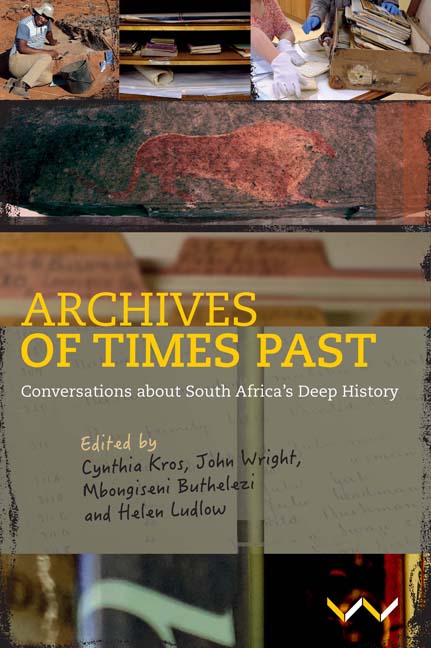Book contents
- Frontmatter
- Contents
- List Of Illustrations
- Acknowledgements
- Editorial Note
- Map
- PART I FIRST THOUGHTS ABOUT THE ARCHIVE
- PART II COMMENTARIES AND CONVERSATIONS
- PART III BECOMING EXPLORERS
- PART IV ENGAGING WITH ARCHAEOLOGY AND ROCK ART
- PART V CONFLICTING OPINIONS
- PART VI FURTHER THOUGHTS
- Glossary
- Contributors
- Index
Chapter 19 - Mkhize Historians Dispute the Past
Published online by Cambridge University Press: 26 May 2022
- Frontmatter
- Contents
- List Of Illustrations
- Acknowledgements
- Editorial Note
- Map
- PART I FIRST THOUGHTS ABOUT THE ARCHIVE
- PART II COMMENTARIES AND CONVERSATIONS
- PART III BECOMING EXPLORERS
- PART IV ENGAGING WITH ARCHAEOLOGY AND ROCK ART
- PART V CONFLICTING OPINIONS
- PART VI FURTHER THOUGHTS
- Glossary
- Contributors
- Index
Summary
In 2009, I started research towards a PhD degree in anthropology at the University of Cape Town. I set out to explore the many ways in which people in the Mbumbulu area south of Durban sought to remember, record and preserve the past. I wanted to study how chiefs promoted the importance of traditions and custom, and how local historians wrote about Mbumbulu's history. I also wanted to examine a digital libraries project called the Ulwazi Programme, run by the eThekwini Municipality. The organisers of the programme aimed to record knowledge of history and tradition among ordinary people in the municipality, including Mbumbulu.
One of my contacts was Mwelela Cele, who was the librarian in the reading room at the Killie Campbell Africana Library in Durban. He directed me to Siyabonga Mkhize, an Mkhize historian based in Mbumbulu. I first met Siyabonga at his house in Mbumbulu in December 2009, and held a long interview with him. He told me in great detail about Mkhize history as he saw it. Afterwards, I phoned and emailed him several times to clarify some of the points that he had told me about. I also asked members of staff at the Killie Campbell Library to confirm facts about his life.
My interest in chiefs’ views of history led me to the Amakhosi Support Office in Durban. This is an office set up by the eThekwini Municipality to help chiefs deliver services to local communities. Here, in August 2010, I met Victor Mkhize, the manager of the office. In my interview with him, I discovered that he had views on Mkhize history that were very different in many ways from those of Siyabonga Mkhize. Over the following year, I had three more interviews with Victor. We discussed the history of the Mkhize people in Mbumbulu. Victor spoke emotionally about how he was opposed to Siyabonga's version of Mkhize history, which he saw as biased and incorrect.
To understand why these two Mkhize historians have different views of the past, and why this is an emotional issue, we need to know something about their own backgrounds. We also need to know something about the deeper political disputes that have divided the Mkhize people in the Mbumbulu area.
- Type
- Chapter
- Information
- Archives of Times PastConversations about South Africa's Deep History, pp. 252 - 260Publisher: Wits University PressPrint publication year: 2022

